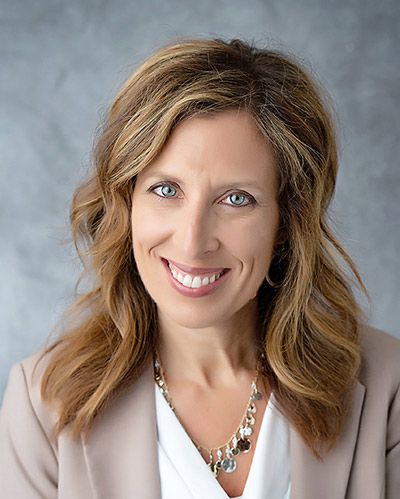In November of 2021, University of Maryland, College Park President Darryll J. Pines and University of Maryland, Baltimore President Bruce E. Jarrell named eight professors as the inaugural MPower Professors. This award from the University of Maryland Strategic Partnership: MPowering the State (MPower) recognizes, incentivizes, and fosters faculty collaborations between the College Park and Baltimore campuses.

Deanna L. Kelly, PharmD, BCPP, is a professor in the Department of Psychiatry at University of Maryland School of Medicine (UMSOM) and an affiliate professor at the University of Maryland School of Pharmacy (UMSOP). She also is the director and chief of the Treatment Research Program and currently Acting Director at the Maryland Psychiatric Research Center. Dr. Kelly has led and been involved in numerous clinical trials involving schizophrenia and severe mental illness and has been active in psychopharmacology research for the past 25 years.
In 2017, Dr. Kelly was awarded the Brain and Behavior Research Foundation’s Maltz Prize for Innovative and Promising Schizophrenia Research.
Dr. Kelly graduated magna cum laude with a bachelor’s degree in pharmacy and a doctor of pharmacy degree from Duquesne University’s Mylan School of Pharmacy, and she completed a residency at UMSOP in 1997. She is board certified in psychiatric pharmacy practice. She has been continuously grant funded from NIH for over 20 years.
Can you briefly explain the type of research you do?
I am interested in improving the lives of people with schizophrenia and related disorders, and my research is focused on finding ways to improve care using advances in technology. I am working on cutting-edge projects with technology such as point-of-care monitoring, detection of blood biomarkers such as oxidative stress, and using social media and language signals to prioritize mental health care.
I conduct clinical research to test new treatments and better understand mechanisms and markers of illness. I have much interest and experience with translational work in people with schizophrenia involving inflammation, diet modulation, gut-to-brain connections, and the antipsychotic clozapine.
What drives you to do this research?
I am very passionate about improving care for this population of patients who are often stigmatized and marginalized. I am fascinated by science and enjoy trying to better understand severe mental illness, as well as current and future treatment options. We have helped many people on the path to recovery and I hope that many more people will have the opportunity to improve their care and chances of recovery with the work we do.
What did it mean to you personally to be named an MPower Professor?
It was an amazing honor to be named an MPower Professor. Being recognized for the work I do on a day-to-day basis to improve care and lives for people with severe mental illness validates the importance of my research. The funding will help to expand initiatives and collaborations and lead to opportunities for grant funding.
How do you collaborate with researchers outside of your discipline?
I have a long history of collaborating with researchers beyond my discipline. I have a doctorate degree in pharmacy, and entering the research world was unusual. Pharmacists are less likely to conduct independent research. During my 25 years of conducting research, every project I have worked on has involved collaboration with others outside my discipline. I have enjoyed working with others with different expertise on a variety of projects. Without collaborations, we would never have been able to expand our immune and gluten work, nor would we have been able to lead a multisite clozapine trial in Nigeria. Some of my collaborators at the University of Maryland, College Park are engineers, linguists, and computer scientists. It takes time to develop these relationships and understand how we can benefit from each other. It expands and stretches us as scientists.
Why is this collaboration important to you?
The model of collaborative research is needed, as no one has the expertise or ability to go far alone. I feel we can only make truly innovative discoveries when we can build off of each other’s ideas.
Please name the researchers you have worked with on MPower collaborations:
● Reza Ghodssi, Herbert Rabin Distinguished Chair in Engineering, A. James Clark School of Engineering
● Gregory Payne, Research Professor, Institute for Bioscience and Biotechnology Research
● Eunkyoung Kim, Assistant Research Scientist, Institute for Bioscience and Biotechnology Research
● Philip Resnik, Professor, College of Arts and Humanities
● Carol Espy-Wilson, Professor, A. James Clark School of Engineering
● John Dickerson, Associate Professor, College of Computer, Mathematical, and Natural Sciences
● Jessica Magidson, Associate Professor, College of Behavioral and Social Sciences
How do the funds awarded from MPower support your research and help facilitate
collaborations with other researchers?
We have been able to expand recruitment for a collaborative project that has recently led to NSF funding. We have been able to expand collaborators and bring in additional expertise from researchers at other top universities to begin new collaborations. The MPower support is allowing us to dream big with some ideas forming around a large collaboration in Africa.
What are the next steps for your research?
I have a few grants pending to expand work, and I especially want to help junior faculty and young trainees begin collaborations. We are looking to expand specifically in areas using novel technology to detect biomarkers such as oxidative stress and expand grant funding opportunities.
To learn more about Dr. Kelly’s research, visit the Maryland Psychiatric Research Center
(MPRC) Treatment Research Program website.
